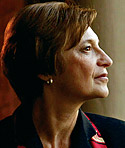Marjorie Garber
Presented by Sue E. Houchins, Associate Professor of African American Studies
 Described by The New York Times as “one of the most powerful women in the academic world,” Marjorie Garber is a leading Shakespearean scholar and cultural critic.
Described by The New York Times as “one of the most powerful women in the academic world,” Marjorie Garber is a leading Shakespearean scholar and cultural critic.
The William R. Kenan Jr. Professor of English and American Literature and Language at Harvard, she also chairs the university’s Department of Visual and Environmental Studies and directs its Carpenter Center for the Visual Arts. Garber is the author of four widely admired books on Shakespeare, including her most recent, Shakespeare After All (Pantheon, 2004), which received the 2005 Christian Gauss Book Award from Phi Beta Kappa. An extensive study of Shakespeare’s plays, the book represents the fruits of more than 20 years of teaching large lecture classes at Harvard and Yale. Newsweek chose the volume as one of the five best nonfiction books of 2004 and called it “an indispensable introduction to an indispensable writer . . . Garber’s is the most exhilarating seminar room you’ll ever enter.”
Described by women’s studies pioneer Catharine Stimpson as “the liveliest, wittiest, and most scintillating of writers about our culture,” Garber has addressed a wide range of issues: from cross-dressing and cultural anxiety to bisexuality and the eroticism of everyday life, from our love of pets to our national obsession with the word “genius.”
Her work on issues concerned with educational theory and university culture includes Academic Instincts (Princeton, 2000), Quotation Marks (Routledge, 2002), and A Manifesto for Literary Study (University of Washington, 2003). Currently, she is at work on a new volume of essays about the arts, the university and public culture.
A graduate of Swarthmore College (B.A. 1966, L.H.D. 2004) and Yale University (Ph.D. 1969), she has taught at Yale, at Haverford, and — since 1981 — at Harvard. She is president of the Consortium of Humanities Centers and Institutes and senior trustee of the English Institute. Garber will receive the honorary degree of Doctor of Humane Letters.